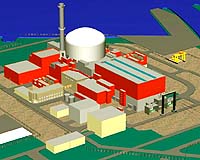 |
Paris (AFP) Nov 4, 2009 Safety fears and threats of winter power cuts have taken some of the shine off France's world-beating nuclear industry, the country's main source of power and a key plank in its foreign trade strategy. France generates more than three-quarters of its electricity through nuclear power, more than any other country by proportion, and President Nicolas Sarkozy has made exporting French know-how a top priority. China and Finland are already building French-designed new generation reactors, and talks are underway to export the European Pressurised Reactor (EPR) model to Britain, India, Abu Dhabi and the United States. Alarm bells rang this week, however, when French, British and Finnish regulators called on the French nuclear engineering firm Areva to review the design of the planned plants' safety and control systems. Meanwhile, French businesses and householders in some regions could face winter power cuts or rationing after labour strikes delayed the refuelling of France's older plants and left almost one third of them off line. Areva and French power firm EDF have scrambled to insist that the EPR design, one of which is already under construction in Normandy, is safe and will not be delayed by the European regulators' concerns. Any delay, however, could cost France its headstart in what will become a very competitive market to supply the 21st century's first new generation of plants, with Japanese, Russian, Chinese and South Korean firms circling. On Monday, safety agencies called on Areva to correct what they see as a potential design flaw in the EPR, saying that the day-by-day control systems of the reactor are too closely entwined with emergency safety systems. "Independence is important because, if a safety system provides protection against the failure of a control system, then they should not fail together," the British, French and Finnish agencies said in a joint statement. French environment minister Jean-Louis Borloo insisted "the fundamentals of the EPR are not in question" and Areva said it would address the concern, which it said "does not call into question the safety of the reactor." Experts, however, said there was a small chance that the regulators' complaint could add to the programme's existing delays and cost overruns. Colette Lewiner, a vice president and energy specialist at consultants Capgemini, said Areva would be asked to provide documentation to prove its systems will be safe, "which is not significant in terms of costs or delay." However: "Now, on the other hand, in the letter that the regulators sent, they said: 'Your control system is very complicated, you should think about a new architecture'," she told AFP. "So, if they don't accept the explanations that they will be given, if they say 'You've got to change the design of your control system', that would be much more of a problem," she said, adding that she did not think this likely. France has stolen a march on competitors in the race to build the most new-generation nuclear power stations and snap up billions of dollars in contracts worldwide. But any more delays -- both France's Flamanville EPR and Finland's Olikuluoto are already behind schedule -- could cost it sales. China has signed an eight-billion-euro (11.8-billion-dollar) contact to buy two Areva EPRs, but a similar agreement reached this year with India is still a draft "memorandum of understanding". Meanwhile, if potential customers are looking to France's domestic nuclear market as a model, they might find problems there as well. Last week, French power grid operator RTE warned that electric production was at such a reduced level that it would be forced to import current over the winter and might have to ration or even cut supplies in some regions. EDF refused to confirm how many power plants were out of service, but a telephone survey of nuclear sites by AFP showed on Monday that at least 19 of the 58 reactors were down and one was operating at 60 percent capacity. A strike at EDF earlier this year delayed the annual programme to replace fuel rods at the plants, causing a backlog which will result in output being reduced for several months to come, industry executives said. Ordinary winter temperatures will force RTE to import 4,000 megawatts between November and January, and at "temperatures durably 7 to 8 degrees Celsius below seasonal norms, imports could exceed technical limits." In this case, suppliers will be forced to ask big industrial clients to ration power use and might eventually resort to power cuts, particularly in poorly-supplied Britanny and the Nice region on the Cote d'Azur. Share This Article With Planet Earth
Related Links Nuclear Power News - Nuclear Science, Nuclear Technology Powering The World in the 21st Century at Energy-Daily.com
 Nuclear safety bodies call for redesign of EPR reactor
Nuclear safety bodies call for redesign of EPR reactorParis (AFP) Nov 2, 2009 Nuclear regulators in France, Britain and Finland said Monday they have told French nuclear giant Areva and its foreign partners to correct a safety design flaw on its latest-generation EPR reactor. Any redesign could increase already costly delays in completing the first two of the reactors being built by Areva in France and Finland, and undermine French attempts to create a massive export ... read more |
|
| The content herein, unless otherwise known to be public domain, are Copyright 1995-2009 - SpaceDaily. AFP and UPI Wire Stories are copyright Agence France-Presse and United Press International. ESA Portal Reports are copyright European Space Agency. All NASA sourced material is public domain. Additional copyrights may apply in whole or part to other bona fide parties. Advertising does not imply endorsement,agreement or approval of any opinions, statements or information provided by SpaceDaily on any Web page published or hosted by SpaceDaily. Privacy Statement |